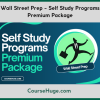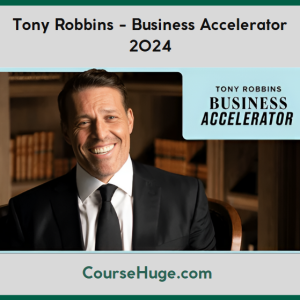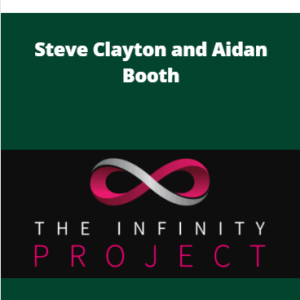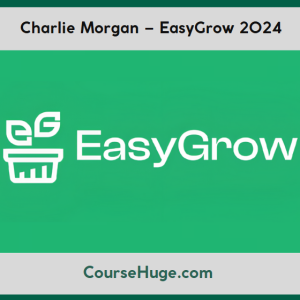Justin Welsh – The Creator MBA
$897.00 Original price was: $897.00.$12.00Current price is: $12.00.
Justin Welsh The Creator MBA Course [Instant Download]

1️⃣. What is The Creator MBA?
The Creator MBA teaches you how to build a profitable online business from your skills and knowledge.
Justin Welsh provides a complete system to transform what you know into sustainable income without complexity or overwhelm.
The course includes 14 chapters, 111 lessons, and 19 hours of video with practical strategies for idea validation, offer creation, and business automation.
📚 PROOF OF COURSE



2️⃣. What you’ll learn in The Creator MBA:
The Creator MBA gives you everything you need to build a profitable online business without complexity. Here’s what you’ll learn:
- Business foundation frameworks for testing ideas and creating your unique value proposition
- Customer journey mapping to understand how people find and buy your offers
- Content creation systems for building awareness and attracting your ideal audience
- Email marketing strategies to build and monetize an audience you own
- Offer creation processes to develop products and services that sell well
- Business optimization techniques for growing revenue without adding complexity
This course works for both beginners and experienced entrepreneurs wanting to build or improve their online business. By the end, you’ll have a complete system to create steady income from your expertise.
3️⃣. The Creator MBA Course Curriculum:
✅ Section 1: Introduction
This section introduces the instructor and course structure, providing essential resources and guidance for navigating the curriculum. Students will learn how to maximize their learning experience and access supplementary materials through the Notion Workstation.
Module 1.1: Course Resources
This module contains important reference links and supporting materials that students will use throughout their learning journey. These resources are designed to enhance understanding and provide practical applications of concepts.
Module 1.2: Course Structure & Overview
This module outlines the organization of the course and sets expectations for the learning experience. Students will understand how each component fits into the broader curriculum and how to navigate between sections effectively.
✅ Section 2: The Long Game Journey
This section establishes the foundation for a sustainable creator business mindset, emphasizing patience and realistic expectations. Students will learn to develop a long-term vision and understand how success builds gradually over time.
Module 2.1: Foundation Concepts
This module explores fundamental principles for creator entrepreneurs, focusing on patience, vision development, and setting appropriate expectations. Students will gain perspective on realistic timelines for business growth.
Module 2.2: Visual Resources
This module provides supporting visual materials and reference links that illustrate key concepts about the creator journey. These resources offer real-world examples of successful long-term business development.
✅ Section 3: Choosing a Business Idea
This section guides students through the process of identifying viable business opportunities using a structured framework. Students will learn market validation techniques to test assumptions and ensure their ideas have genuine potential.
Module 3.1: Idea Framework
This module presents a simple two-part framework for generating and evaluating business ideas. Students will learn a systematic approach to identifying opportunities aligned with their skills and market demand.
Module 3.2: Market Validation
This module explores practical techniques for validating business concepts before significant investment. Students will learn how to gather meaningful feedback and assess market potential for their ideas.
✅ Section 4: Creating Your Unique Value Proposition
This section walks through the development of a compelling value proposition that differentiates your offering in the marketplace. Students will learn to articulate their unique benefits and build a foundation for effective marketing.
Module 4.1: Value Statement Development
This module guides students through creating clear, compelling value statements that resonate with target audiences. Students will learn to identify and articulate the core benefits of their offerings.
Module 4.2: Movement Creation
This module explores how to build a movement around your brand that attracts dedicated followers. Students will learn strategies for developing community engagement that extends beyond transactional relationships.
Module 4.3: UVP Implementation
This module provides real-world examples of effective unique value propositions and highlights common mistakes to avoid. Students will learn to refine their UVP through practical application.
✅ Section 5: The Modern Customer Journey
This section examines the stages customers move through when discovering and engaging with your offerings. Students will learn to create appropriate content and messaging for each stage of awareness.
Module 5.1: Funnel Awareness Stages
This module breaks down the customer journey from problem unaware to most aware stages. Students will learn to identify where prospects are in their journey and develop appropriate messaging.
Module 5.2: Case Studies and Advanced Techniques
This module provides real-world examples of effective customer journeys and introduces advanced strategies like daisy-chained prompts. Students will see practical applications of funnel concepts.
✅ Section 6: Building & Distributing Content
This section explores strategic content creation and platform-specific distribution techniques. Students will learn to leverage social platforms for audience growth and engagement.
Module 6.1: Content Fundamentals
This module introduces the core principles of effective content creation for audience building. Students will learn to develop a sustainable content strategy aligned with their business goals.
Module 6.2: LinkedIn Strategy
This module provides a comprehensive approach to building authority and audience on LinkedIn. Students will learn profile optimization, storytelling techniques, and community building strategies.
Module 6.3: Twitter Strategy
This module covers effective approaches for growth and engagement on Twitter. Students will learn profile design, audience targeting, and content optimization specific to this platform.
✅ Section 7: Capturing Traffic
This section focuses on converting audience attention into measurable actions through effective lead generation. Students will learn to design attractive lead magnets and optimize landing pages.
Module 7.1: Lead Magnet Development
This module guides students through creating valuable resources that attract potential customers. Students will learn to design lead magnets that address specific audience needs.
Module 7.2: Landing Page Optimization
This module covers design principles and copywriting techniques for high-converting landing pages. Students will learn to create pages that effectively communicate value and encourage action.
Module 7.3: Lead Qualification
This module explores post-lead magnet surveying to gather insights and qualify prospects. Students will learn to use data collection to improve targeting and personalization.
✅ Section 8: Creating Stacked Offers
This section teaches how to build a progressive series of offers at different price points. Students will learn to develop service businesses and digital products that create multiple revenue streams.
Module 8.1: Offer Structure Fundamentals
This module introduces the concept of offer stacking and its practical implementation. Students will learn to create logical progression between different offer types.
Module 8.2: Service Business Development
This module covers the creation and optimization of service-based offers. Students will learn pricing strategies, automation, and scaling techniques for service businesses.
Module 8.3: Digital Product Creation
This module guides students through developing and launching digital products. Students will learn platform selection, minimum viable product creation, and effective launch strategies.
Module 8.4: Subscription Products
This module explores recurring revenue models through subscription-based offerings. Students will learn to create sustainable value that justifies ongoing customer commitment.
✅ Section 9: Email Marketing
This section covers strategies for building and leveraging an email list as a primary business asset. Students will learn list growth techniques and effective email marketing practices.
Module 9.1: List Building Strategies
This module explores multiple approaches to growing an email subscriber base. Students will learn techniques for attracting qualified subscribers through various channels.
Module 9.2: Email Strategy Implementation
This module covers welcome sequences, segmentation, and optimization of email campaigns. Students will learn to create personalized email experiences that drive engagement.
✅ Section 10: How to Analyze & Improve
This section introduces data-driven decision making for business optimization. Students will learn to identify and track key metrics that indicate business health and growth opportunities.
Module 10.1: Business Metrics
This module covers essential performance indicators for creator businesses. Students will learn which metrics matter most for their business model and how to interpret them.
Module 10.2: Analytics Implementation
This module explores tools and techniques for gathering and analyzing business data. Students will learn to set up systems that provide actionable insights.
✅ Section 11: AB Testing & Optimization
This section teaches systematic testing methodologies to improve business performance. Students will learn to design experiments that lead to meaningful improvements in conversion and engagement.
Module 11.1: Test Implementation
This module covers the fundamentals of setting up and running effective A/B tests. Students will learn to design experiments that provide statistically significant results.
Module 11.2: Results Analysis
This module explores techniques for interpreting test results and implementing findings. Students will learn to translate data into actionable business improvements.
✅ Section 12: Time Management & Productivity
This section provides frameworks for effective time allocation and productivity enhancement. Students will learn to prioritize activities that drive business growth while maintaining work-life balance.
Module 12.1: Time Management Theory
This module introduces evidence-based approaches to productivity and focus. Students will learn conceptual frameworks for understanding effective time use.
Module 12.2: Practical Implementation
This module covers specific techniques and tools for daily and annual planning. Students will learn practical approaches to managing their time as creator entrepreneurs.
✅ Section 13: Business Systems & Automation
This section focuses on identifying and implementing automation to increase efficiency. Students will learn which processes benefit from automation and which require human attention.
Module 13.1: Automation Strategy
This module helps students identify opportunities for systematic improvement through automation. Students will learn to evaluate processes based on automation potential.
Module 13.2: Implementation Examples
This module provides real-world examples of effective automation and boundaries for its use. Students will see practical applications of automation principles.
✅ Section 14: Advanced Content Frameworks
This section presents sophisticated approaches to content creation for established creators. Students will learn advanced strategies for scaling content production while maintaining quality.
Module 14.1: Content Scaling Strategies
This module covers frameworks like curation, hub and spoke models, and AI integration. Students will learn to leverage these approaches for more efficient content creation.
Module 14.2: Content Optimization Techniques
This module explores methods for repurposing, collaborating, and refining content. Students will learn to maximize the value of their content through strategic approaches.
✅ Section 15: Wrapping Up
This section concludes the main curriculum with final thoughts and next steps. Students will receive guidance on implementing their learning and continuing their development.
✅ Section 16: Bonus How to Start From Scratch
This section provides a step-by-step roadmap for complete beginners to establish their creator business. Students will learn a sequential approach to building from zero to a functioning business.
Module 16.1: Foundation Building
This module guides students through identifying skills, developing value propositions, and establishing basic online presence. Students will learn the essential first steps in business creation.
Module 16.2: Offering Development
This module covers creating and testing initial service offerings through discovery calls. Students will learn to validate their offerings through direct client interaction.
Module 16.3: Product Creation
This module guides students through developing lead magnets and first product offerings. Students will learn to transition from services to scalable products.
Module 16.4: Feedback & Iteration
This module focuses on gathering customer insights and refining offerings. Students will learn to use feedback loops for continuous business improvement.
4️⃣. Who is Justin Welsh?

Justin Welsh is an expert in solopreneurship and building profitable internet businesses. He helped grow two companies to over $1 billion and raised more than $300 million before leaving corporate life in 2019.
In just five years, Justin built his own business to $5 million in revenue with 30,000+ customers worldwide. He did this without a big team or outside funding, focusing on lean operations.
Justin specializes in content creation, audience building, email marketing, and digital products. His newsletter “The Saturday Solopreneur” has over 175,000 subscribers.
Beyond The Creator MBA, Justin created successful courses like “LinkedIn OS” and “Content OS” that help entrepreneurs use social platforms for growth. His open approach has earned praise from leaders like Nathan Barry (ConvertKit), Noah Kagan (AppSumo), and Sahil Bloom.
5️⃣. Who should take Justin Welsh Course?
The Creator MBA is for people ready to build a lasting online business. This course helps:
- Aspiring solopreneurs who want to turn what they know into a profitable internet business without needing big teams.
- Corporate professionals looking to start a side business or leave their traditional job.
- Content creators who struggle to make money from their audience and create steady income.
- Early-stage entrepreneurs who need a clear plan to test ideas and build scalable offers.
- Established business owners wanting to improve their online presence and create better systems.
The Creator MBA gives you a complete roadmap for building a sustainable online business. It focuses on creating something simple, profitable, and matching the lifestyle you want – not just making as much money as possible.
If you want quick tricks or aren’t ready to put in regular work, this course isn’t right for you.
6️⃣. Frequently Asked Questions:
Q1: How long does it take to build a profitable online business?
Q2: Do I need a lot of money to start a solopreneur business?
Q3: What are the biggest challenges in solopreneurship?
Q4: How do I attract customers to my online business?
Q5: Can I run a solopreneur business while working a full-time job?
Be the first to review “Justin Welsh – The Creator MBA” Cancel reply
Related products
Business & Finance
Business & Finance
Business & Finance
Business & Finance
Business & Finance
Business & Finance
Business & Finance
Business & Finance












Reviews
There are no reviews yet.